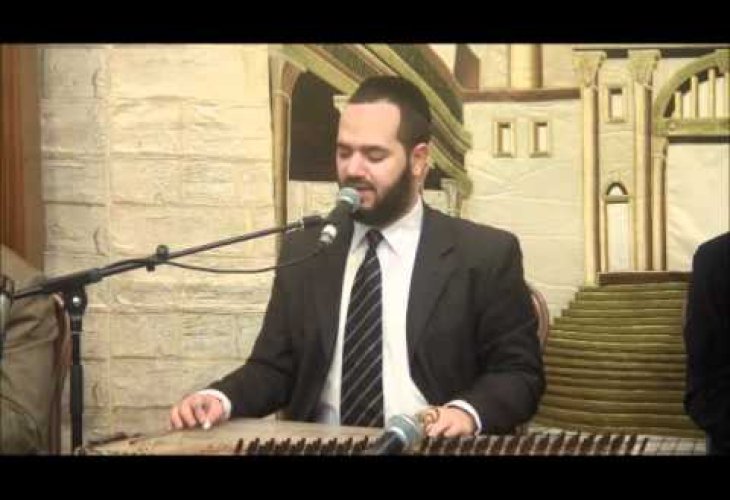Personal Stories
Seeing with the Heart: The Inspiring Journey of Chaim Jerby
Born blind, Chaim became a beloved cantor, musician, and teacher, showing that nothing can stop a determined soul
- Shifi Charitan
- |Updated

When I used to hear the word paytan, a liturgical singer of Sephardic Jewish poetry, I pictured an elderly man wrapped in a tallit, chanting soulfully from the synagogue podium. That image quickly faded when I met Chaim Jerby.
Chaim is just 30 years old, but he’s accomplished more than most people twice his age. A Torah teacher, mentor, paytan, cantor, shofar blower, event producer, and a master of 12 musical instruments, Chaim lives with passion, purpose, and joy. He’s also been blind since birth.
Our conversation took me to places I hadn’t expected. Chaim speaks with such colorful detail, heartfelt laughter, and deep honesty that you almost forget he’s never seen the world he describes. He radiates a love for life and holiness that stays with you long after the conversation ends.
A Childhood in Darkness, a Soul in Light
Chaim was born in Rishon LeZion to a family of three blind children. But his parents never treated him differently. He was raised to be strong, responsible, and capable, qualities that clearly shaped the man he became.
“I grew up in a traditional home,” he says. “Music and liturgical poetry were in my blood. My father and grandfather were paytanim, and I knew from a young age that I loved it.”
At 13, his parents enrolled him with Avraham Azoulay, a well-known cantor and paytan. At the same time, Chaim began playing music and was quickly recognized as a child prodigy. Famous singers like Sarit Hadad and Kobi Peretz invited him to perform. But Chaim didn’t feel comfortable in that world. Even though the fame and fortune were tempting, he chose a different path.
He began attending Torah classes and growing in his religious observance. “I couldn’t give up the Torah world,” he explains. “I didn’t want to perform on mixed stages or in front of female audiences. I wanted to stay true to the holiness of what I was doing.”
Teaching Himself to Play and Build Instruments
How does a blind child learn to play 12 instruments?
“It’s possible,” he says, smiling. “There are ways to learn. I took some lessons, but mostly I taught myself. Music has its own language. You don’t need instructions, you just express what you feel, and people understand.”
Some of Chaim’s instruments are handmade from everyday objects. His favorite flute? It’s made from the plastic handle of a lulav (the palm branch used on Sukkot). “I wanted a flute that would sound just right. One Sukkot, I held the lulav case and asked my father what it was made of. I realized the material was perfect, so I started collecting the cases at synagogue after the holiday,” he laughs.
He also plays violin, oud, qanun (a Middle Eastern string instrument), keyboards, and more.
As his love for Jewish music deepened, so did his spiritual journey. Today, Chaim leads High Holiday prayers, blows the shofar, and elevates souls with his heartfelt voice. But it didn’t come easily.
“I know that no congregation wants to hear, ‘Wait a second, I need to find my place in the Braille siddur (prayer book).’ So I practiced for months and years, just like I’ve done with everything else in life. It’s all about preparation and giving your best.”
Moments of Struggle and Strength
I asked him if he ever feels despair.
“Of course,” he answered. “Anyone who says otherwise isn’t being honest.” Chaim’s wife, Oriya, lost her sight at age 15 due to illness. Today, the two of them are raising their young son, who can see but doesn’t yet understand that his parents experience the world differently.
“There are hard moments,” Chaim admits. “But I remind myself: I got married, I had a child, I’ve already done so much. I’m not giving up now.”
His words fill me with a quiet sense of awe. Most of us, with all our physical abilities, don’t show this kind of clarity or faith. Chaim reminds us what real strength looks like.
Every year, Chaim returns to Rishon LeZion to lead the High Holiday prayers in his childhood synagogue. He pleads from the heart, praying for himself and everyone to truly “see” the Divine light in every sense of the word.
Facing the World and the Congregation
How do people react to a blind cantor?
“There are all kinds,” Chaim says. “Some approach naturally, shake hands, offer kind words. Some are hesitant or uncomfortable. And some don’t approach at all.”
His journey has included help from special people, like Zuzu Musa, conductor of the Israel Radio Orchestra, who supported him early on. But Chaim has clearly earned every step of his success on his own merit.
His story is especially powerful during these Yamim Nora’im, the Days of Awe between Rosh Hashanah and Yom Kippur. In a world where we can physically see and touch everything, how many of us pray with even a fraction of the intention and effort that Chaim does?
To prepare for the Day of Judgment, Chaim doesn’t just pray, he leads others in prayer. He reminds us all that real strength is spiritual, and that the soul sees farther than the eyes ever could.

